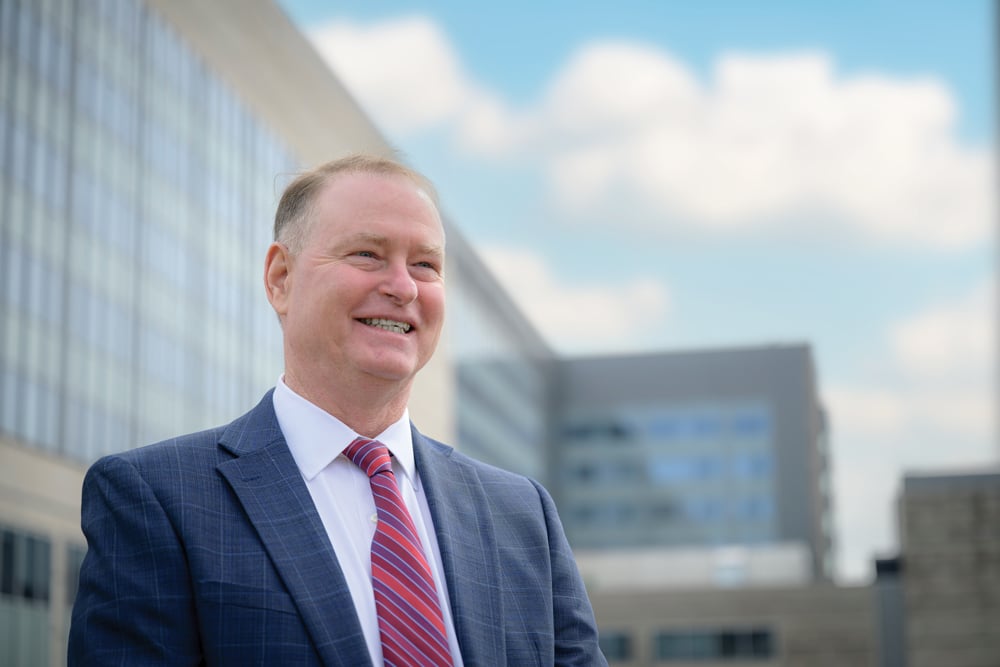New deputy executive vice chancellor charts course for campus sustainability

Since his early days building and remodeling homes, David Flanagan has been on a path to managing increasingly complex construction projects. His career has taken him from small business owner to a project manager on the Big Dig to vice president of facilities at Beth Israel Deaconess Medical Center. In December 2022, he joined UMass Chan Medical School as deputy executive vice chancellor of facilities management.
Flanagan began his career in residential construction, first as an apprentice carpenter and later as the owner of his own construction company. A trip with friends to the Deer Island Wastewater Treatment Plant, the $7 billion centerpiece of the Boston Harbor Cleanup, galvanized his desire to do more than residential construction.
“That was a real mentoring moment for me,” explained Flanagan, a native of Melrose. “I had a friend whose brother was a civil engineer. He took us to Deer Island to see this mammoth undertaking and I was just in awe. I knew then that civil engineering was for me.”
Using the money he’d saved from his construction business, Flanagan enrolled in the civil engineering program at the University of Lowell (now UMass Lowell). After graduation, he joined Parsons Brinkerhoff on the Boston Central Artery Tunnel Project—the Big Dig— managing a range of utility, heavy civil and building projects.
Flanagan followed his time on the Big Dig with an introduction to complex laboratory design and construction at the Massachusetts Institute of Technology, where he managed the development of the brain and cognitive sciences neuroscience center. This experience led to an opportunity to join Beth Israel Deaconess Medical Center, where he rose to vice president of facilities.
While at Beth Israel he oversaw design and construction of several large biomedical research and clinical care buildings, including the 800,000-square-foot Longwood Center for Life Sciences and the 10-story Klarman Building, which includes 185 inpatient and 5 intensive care beds and multiple operating theaters.
After 19 years at Beth Israel, Flanagan was ready for a new challenge with the university system that jump-started his career in engineering and construction.
“One of the things that really drew me to UMass Chan is that the campus has all the elements needed to be fully sustainable and resilient.
We want to get to a place where the Medical School is fully green.”
“I have a real affinity for the UMass system,” said Flanagan, who now resides in Georgetown and Cambridge with his partner. “They gave me my start in engineering. I wouldn’t be here today without UMass. Joining UMass Chan is a sort of homecoming for me.”
Since joining the Medical School, Flanagan has taken steps to modernize the business practices of the facilities department to improve the level and quality of services provided and improve collaboration with the UMass Chan community. One of the first things he tackled was development of structured workflows for the delivery of projects and services, including the creation of a customer portal to track and manage capital project requests.
“There was a real hunger on campus for this kind of system,” said Flanagan. “Now we can track projects and we’re engaging with our customers right from the outset so that we can fully understand their goals and unique programmatic requirements. This allows us to be more responsive to our customers’ needs as they pursue the academic, scientific and clinical mission of the institution.”
In June, Flanagan and the Medical School campus community celebrated the opening of the new education and research building. Designed to achieve LEED Gold certification for energy efficiency and sustainability, the 350,000-square-foot building foreshadows what Flanagan sees for the UMass Chan campus.
“One of the things that really drew me to UMass Chan is that the campus has all the elements needed to be fully sustainable and resilient,” Flanagan said. “We want to get to a place where the Medical School is fully green.”
Toward that end, the new facility includes a geothermal system for heating and cooling that will result in significantly lower carbon emissions— 42 percent less compared to a similar building heated and cooled by fossil fuels alone.
While geothermal systems can reduce the need to burn fossil fuels, energy-saving measures alone won’t make the campus sustainable. Looking further ahead, Flanagan and his team are investigating decarbonization alternatives to generate the campus’s electrical, heating and cooling needs.
“Our responsibility to support without disruption the academic research and clinical care environment of the UMass Chan campus requires a highly resilient and reliable energy infrastructure,” said Flanagan. “The need for operational continuity is paramount. Alternatives such as solar and wind are not viable due to land constraints. We’d need land half the size of the town of Shrewsbury to meet our electrical needs and a battery the size of Polar Park. Instead, we are investigating new technologies, such as hydrogen and microreactors that are on a path to commercial viability. “These could take the place of fossil fuel-based energy generation and help fulfill our complex energy requirements in a cost- effective and environmentally responsible manner,” said Flanagan. ■